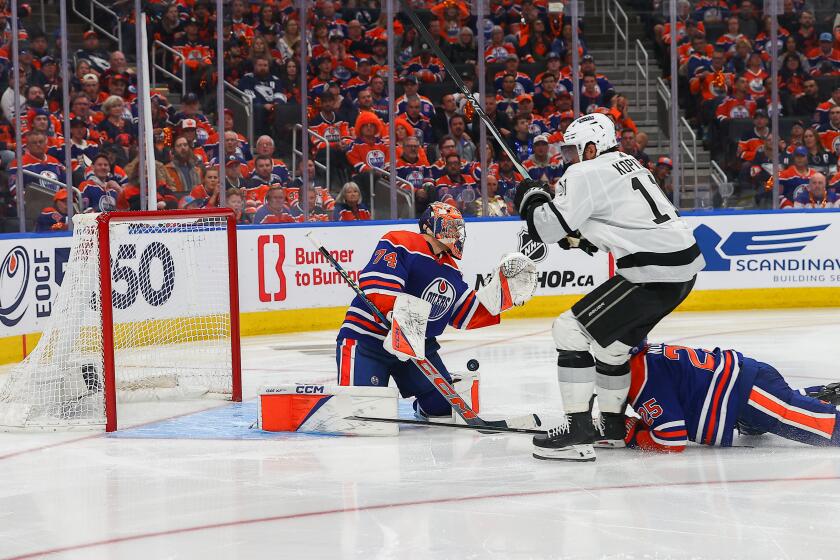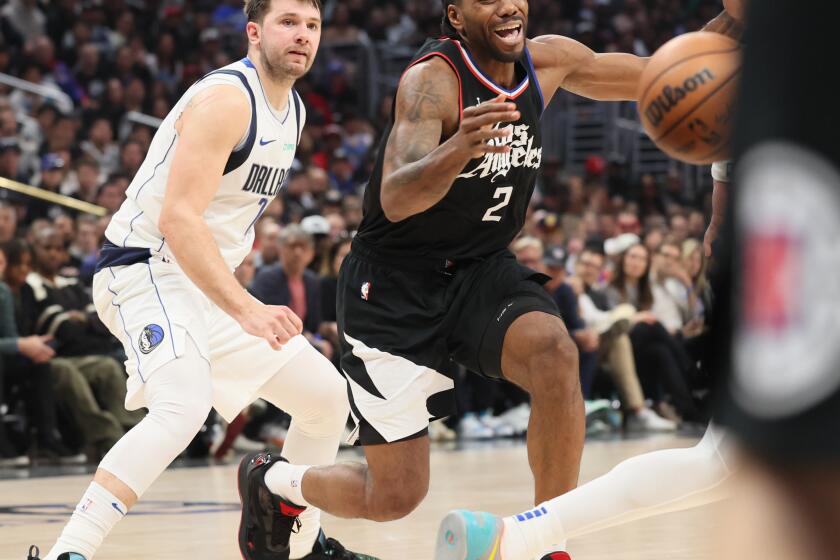NBA contract takes digital leap forward
Walt Disney Co.’s ABC and ESPN and Time Warner Inc.’s TNT agreed Wednesday to pay the National Basketball Assn. $7.4 billion over eight years for rights to televise its games and, in one of the first deals of its kind, stream action on the Internet and mobile devices.
The deal, which begins in 2008 and runs through the 2015-16 season, works out to an average of about $930 million a year. That’s a 22% increase over the $765-million average under the current agreement, industry sources said. The expanded digital rights contributed to the increase, along with the continuing rise in the cost of television rights.
The cost of sports broadcast rights has escalated despite a decline in television ratings for the recent NBA finals and overall TV viewership of the league’s regular-season games. That is because sports are still considered appointment viewing on television and reach a demographic swath coveted by advertisers, who are also trying to expand their digital reach.
The deal gives the NBA a television presence every day of the week. ESPN will carry games on Wednesday and Friday, ABC will broadcast games on Sunday, TNT will continue its Thursday double-header and NBA TV will carry games on Monday, Tuesday and Saturday.
Under the deal, Time Warner and Disney will have rights to about 200 games and will be free to spin off digital feeds to any of their affiliated broadcast, cable, Internet and mobile assets. The NBA retains digital rights to the remaining 1,000 or so regular-season games.
Basketball fans looking for their fix will be able to watch live games on TV on ESPN, online through ESPN360.com, or on their cellphones via ESPN Mobile TV. They can also view game highlights on digital versions of ESPN’s signature shows.
“The desire for sports content has not changed over the years, but how fans consume it has,” said David Levy, president of Turner Sports, which has similar rights for TNT OverTime and other Time Warner properties. “Now, more than ever, viewers have sports content and information at their fingertips, due to the growth of digital platforms such as wireless and broadband.”
ESPN’s internal studies found that teenagers, college students and young adults -- the mainstays of the sports demographic -- digested sports differently from their parents. They spend more time online, checking scores or watching video highlights. They download and listen to sports-oriented podcasts and increasingly use their mobile phones to access the Web.
On average, they spend about four hours a week on digital platforms, compared with about an hour a week for the typical older viewer, said Artie Bulgrin, ESPN’s senior vice president of research and sales development.
“It’s not just about traditional media anymore,” Bulgrin said. “Traditional media is not being cannibalized, but media use is expanding. With our fans, if it’s available to them to use, they’re going to use it. If they can’t be near a TV, they’re going to do it over their phone, do it over the PC. And we plan to be there and serve it up to them.”
The NBA hinted in February that a new rights package was in the works, but it took until Wednesday for the parties to reach the agreement. The intricacies of allocating digital rights prolonged licensing talks, Levy confirmed. He said it “expanded the conversation dramatically and obviously kept our lawyers working.”
But the wait could bring rich rewards. John Skipper, ESPN’s executive vice president of content, said that, on average, more than 1 million people visited its site every day during the NBA playoffs and some 700,000 used mobile phones to receive NBA updates. Over the course of the season, ESPN showed more than 32 million video highlights online.
It’s not just avid basketball fans who can’t get enough of the NBA. Advertisers also are following the action -- and chasing those consumers.
Skipper said ad slots for online NBA video highlights were sold out. “This is a growing business for us,” he said.
That’s not to say television is no longer valuable. ABC’s recent broadcasts of the NBA finals matchup between San Antonio and Cleveland averaged an anemic audience of less than 9.3 million viewers per game, according to Nielsen Media Research. That’s a far cry from the 1990s, when a championship series featuring Michael Jordan’s Chicago Bulls would draw as many as 29 million TV viewers.
Yet the recent finals still allowed ABC to snag solid prime-time ratings. “So we are quite pleased,” Skipper said. “It’s been a consistent performer for us.”
The digital rights deals being fashioned by leagues could reshape how content is used to generate revenue. Rather than simply selling commercial time during an NBA broadcast, observers said, Time Warner and Walt Disney would sell across-the-board packages that included television, Internet and cellphone advertising -- along with whatever other devices, such as the iPod, that can deliver NBA games, statistics and other sports-related content.
“Because the market is continuing to fragment, ratings continue to at best stagnate, and in most cases go down,” said Marc Ganis, president of SportsCorp Ltd. in Chicago. The hope is these new digital offerings “will help make up for what the broadcast revenues are not in terms of growth.”
Even as channels like ESPN work to extend their reach, some sports leagues such as Major League Baseball and the National Football League are keeping their digital assets to themselves and maintaining their own websites.
“Leagues are giving a little bit of their new media rights to their broadcast partners, but they hope to retain the bulk to exploit themselves, or license them separately,” said Chris Russo, a New York-based consultant who formerly operated the NFL’s new-media division.
In the early days of the Internet, leagues were content to pay outsiders such as ESPN and CBS SportsLine to manage their websites. That started to change as advertising revenue began to flow online.
“It’s a real business now,” Russo said. “So much advertising money is flowing into the online space. That’s the real driver of this business. There’s much more focus on this as an operational part of your business versus something that’s to be licensed to someone else.”
--
greg.johnson@latimes.com
More to Read
Get our high school sports newsletter
Prep Rally is devoted to the SoCal high school sports experience, bringing you scores, stories and a behind-the-scenes look at what makes prep sports so popular.
You may occasionally receive promotional content from the Los Angeles Times.






